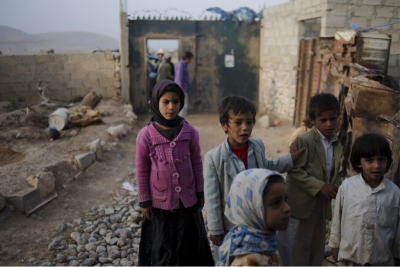Yemen: US-Backed Saudi Coalition Recklessly Killing Civilians, US Mainstream Media Nowhere to Be Seen

Yemeni children stand outside the Huwaiti home, as the mother of Mohammad and Ahmad mourns. She lost both of her sons, ages 17 and 14, who were selling produce on the side of the road, to a Saudi-led coalition airstrike in Al Joob village. Photo Source: Alex Potter
Five months ago, a Saudi-led coalition of Gulf nations began a bombing campaign in Yemen. Backed by the U.S. government through verbal support and military weapons, the Saudi coalition has recklessly killed civilians, ordered an economic blockade that refuses to allow basic necessities into an already-poor country, and it fails to uphold ceasefire agreements time and again.
As an organization committed to speaking out against reckless US militarism, this aggression against Yemen is a prime example of how the US perpetuates war without having soldiers on the ground or leading the charge. The mainstream media has also continually covered the ongoing violence of ISIS against civilians, ultimately helping the expanding breadth and power of US military involvement in the region. In the case of Yemen, however, US mainstream media is nowhere to be seen despite US involvement, the high civilian death toll and humanitarian crisis now plaguing the country.
Help us stand against this aggression on Yemeni civilians.
In the past two weeks alone, 202 civilians have been killed in Yemen, bringing the number of civilian Yemeni deaths to 1,895 according to the UN. Many of these deaths are due to the use of US-made cluster munitions, which have been banned by over a hundred countries. The United States, which has yet to sign on to the ban, continues to create, use, and sell cluster munitions despite the overwhelming evidence that they directly harm and increase the civilian death toll [1].
Despite the high civilian death toll due to the bombing campaign, Yemen was an already-poor country with millions of Yemenis who were food insecure. Since the bombing, the UN estimates that the original number has almost doubled, leaving 80 percent of of the population, or 21 million Yemenis, in need of basic assistance [2]. The severe food insecurity is only being escalated by the blockade and bombings by Saudi Arabia and its allies, leaving millions to an unprecedented humanitarian crisis.
Will you join us in stopping the Saudi attack on Yemen?
This increased lack of regard for human life and an adoption of the rhetoric of the “War on Terror” by the Saudi coalition only serves to upend an already unstable region. As the US now wages proxy wars through support of allies like Saudi Arabia and the mainstream media continues to ignore this impending crisis, it is more important than ever to focus on how the US military industrial complex continues to impact civilians around the world. And we intend to keep up that conversation and pressure and we know you will be with there with us.
In solidarity,
Iram Ali
Associate Director, Operations & Development
Iraq Veterans Against the War
[1] “How US Cluster Bombs Banned by Most Ended Up in Yemen.” Mother Jones, June 9, 2014.
[2] “As Yemenis Starve, Saudi Arabia is Accused of War Crimes in the Country.” Vice, July 28, 2015.

